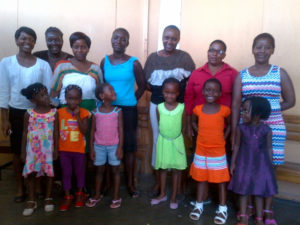Shyam readily – and fondly – recalls observing young girls in Zimbabwe skipping their way to school at 4:30 in the morning. It’s a memory he can recount in vivid detail – and one that certainly left an impression on him. “There’s nothing like the sunsets and sunrises in Africa. The soil is blood red, the trees are the darkest of greens, the stars are fading. It is unbelievably peaceful. On this particular morning, these five or six young girls, their hair done up and their uniforms beautifully starched, skipped by me, so eager to go to school. It was just a regular day, but they were so excited – even despite having miles to go.”
Inspired by this enthusiasm, Shyam started SKIpgo, a SKI Charities program focusing on early stage scholarships. He believes that early-stage learning is the most important part of someone’s education, because it’s where you can make the greatest impact.
SKIpgo participants range from three to five years of age and are taught good study habits, and even simple things like hygiene, self-respect, and respect for others. The schools that these girls are placed in “are not just about teaching them English or history or math. It’s about teaching them how to be strong, independent women. And if they grow up with that idea, if we engrain that in them from the very beginning, they grow to become the leaders of their community, to be civic-minded women, and to prioritize education. They’re like sponges at that early stage. They absorb everything.”
The SKIpgo scholarship is also a preventative measure. A lot of women in developing countries go down a different path, where education isn’t prioritized. Some women get pregnant very early, or don’t have the confidence to say ‘I’ll have a husband later. I can do that when I’m in my later teens or 20s. Let me get an education first, because that will strengthen my family and my future, and the future of the community.’ The scholarship incentivizes education, something that many Zimbabweans already place a lot of value on.
Scholarship recipients are chosen by the SKI Charities’ local team. Elizabeth, our project manager in Zimbabwe “talks to trusted people in the community to get references on girls ages 3-5 who are needy, from a financial point of view, but who come from families and environments where they will be given the opportunity to maximize their educational potential.” Our local team makes sure that participants are supported by their families and encouraged by their parents to study and work hard.
Usually, the pool of potential SKIpgo scholars is 2-3 dozen. Elizabeth whittles that down to a short list of ten, by interviewing them and ensuring that the candidates will have the potential to grow into their educations. Because SKI Charities can only control the financial part of it, it’s important that we make sure the girls are coming from a home that encourages early stage education, studying, and female empowerment. “The home environment is something we don’t have control over,” Shyam contends, “So we try to gauge that in the interview process.”
After selecting candidates (so far, four per year), we choose the schools they attend. “We vet every school in the community,” Shyam asserts. “Some schools are run as businesses and try to make as much money as they can. Others have a history, have strong teachers, strong facilities, and we want to direct our girls towards those schools. That way, there’s no reason for them not to succeed in their education.”
Every term, the girls are monitored on their performance. We talk to their teachers and their parents. Ideally, we would continue to support these girls every single year, but it’s just not feasible. The idea is to get them off on the right foot, and to ensure, to the best of our ability, that their families will continue to support their education. SKI Charities is there for financial support, but ultimately, it is the girls’ home life that will determine their success.
The hope is that these girls will begin to value their own education from an early age, and from there, continue to push themselves. It will require self-initiative to do that, as well as a positive familial infrastructure. But the first step, providing the opportunity for growth and success, is just the open door that these young girls need.



